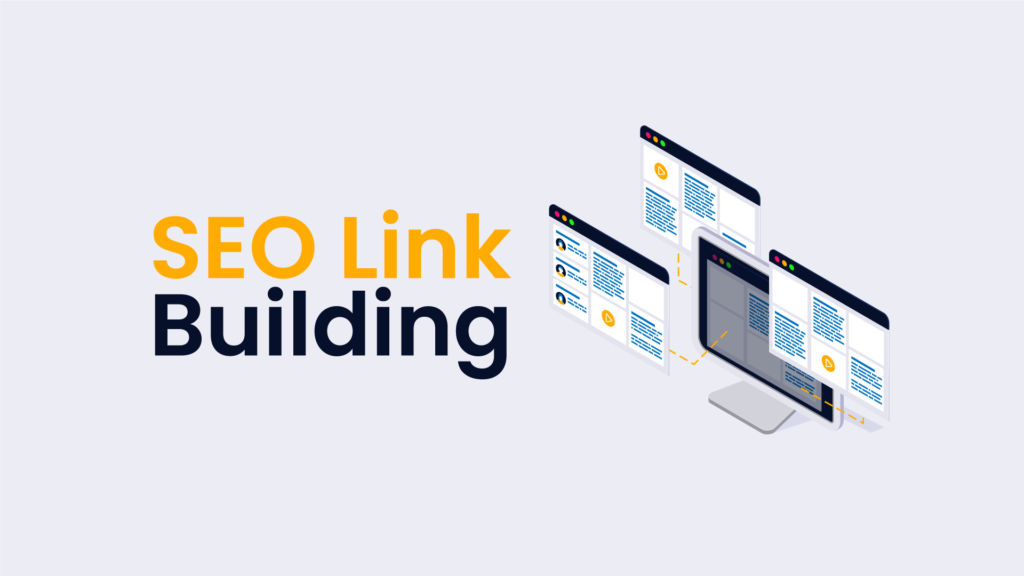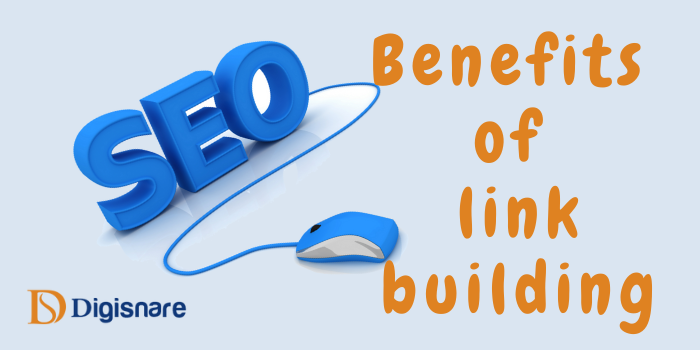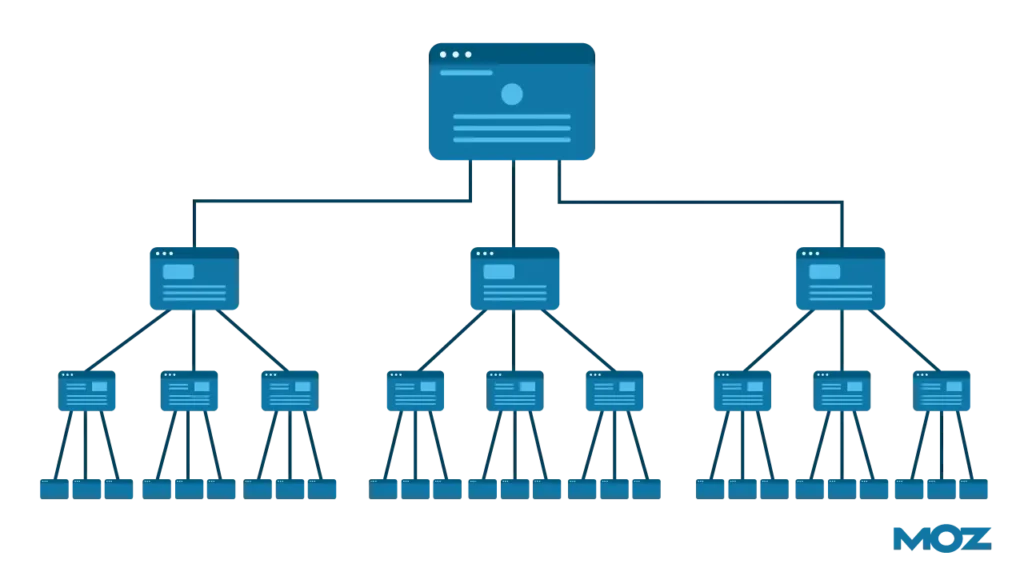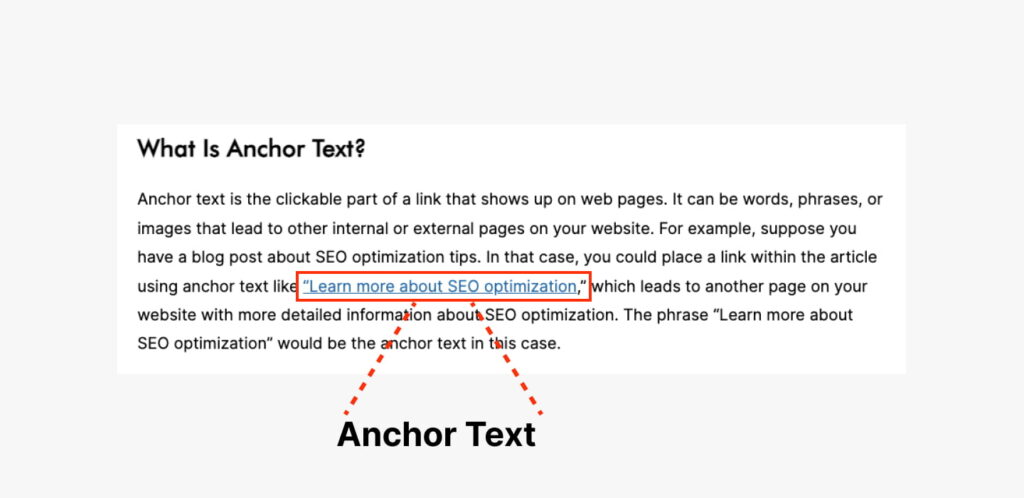
Link building for SEO is the process of acquiring hyperlinks from other websites to your website. For search engine optimization, the goal of link building is to increase the quantity of high-quality inbound links to a webpage in order to increase ranking.
Link building is a set of SEO strategies that aim to build a network of links to a page to drive traffic and strengthen its authority in search engines.
Links can be either external or internal. In link building terms, the external ones come from other sites, also referred to as backlinks or inbound links. These links show Google a site’s popularity and authority in the market. The search engine investigates the links leading to the site to see how often it’s cited and the quality of those references. The more links received from trustworthy and popular sites, the more relevant Google considers the site in its area of expertise.
One of the most important factors in off-page search engine optimization (SEO) is link building, which helps to improve your site’s ranking in search engines. Link building can help you drive more traffic to your website, increase your visibility in search results. And even lead to more backlinks that can help increase your website’s credibility and make it more likely to rank well in search results. In this blog I will tell you some link-building strategies that you can use to help boost your search engine rankings and overall SEO effectiveness.
Conduct keyword research to identify relevant topics and phrases with decent search volume and low competition. Incorporate these keywords naturally into your content to attract targeted traffic.
Guest blogging is an excellent way to build quality backlinks and establish your authority in your niche. By contributing informative and insightful articles to relevant and reputable websites, you can earn backlinks that drive traffic back to your own site.
Broken link building involves finding broken links on other websites and contacting webmasters to suggest replacing those broken links with links to your relevant content. This strategy helps you acquire valuable backlinks but also assists other website owners in fixing broken links and improving their user experience.
Engaging with your target audience on social media platforms can generate valuable backlinks. By sharing your content on social media and actively participating in discussions, you increase the chances of others sharing your content and linking to your website.
Link reclamation involves finding instances where your brand or website is mentioned but not linked to. You can turn those mentions into valuable backlinks by reaching out to the website owners and requesting them to include them. By boosting your website’s traffic and authority.
These are effective link building strategies for beginners and implementing these link building strategies. It is essential for enhancing your website’s traffic and improving your search engine rankings. By focusing on quality link building, you can establish a robust backlink profile and drive targeted traffic to your website.
Collaborating with influencers in your industry can be a powerful link building strategy. Building relationships with influencers and earning their endorsement or mention can attract their followers and gain quality backlinks from their websites or social media profiles.
Many websites have resource pages that curate and list helpful resources and links related to a specific topic. Identifying relevant resource pages in your industry and contacting webmasters to include your content as a valuable resource can lead to valuable backlinks and increased visibility.
link building, it is important to adopt ethical practices that align with search engine guidelines. While there are legitimate and effective link building strategies, it is equally important to be aware of the strategies to avoid. These black hat tactics undermine your website’s integrity and risk penalties from search engines. So, Here are some link building strategies to avoid:
Purchasing links from websites or individuals is a black hat tactic that violates search engine guidelines. While it may seem tempting to acquire many links quickly, search engines like Google are proficient at detecting paid links and can penalize your website accordingly.
Attempting to bribe website owners or influencers for links is another unethical strategy to avoid. Offering monetary incentives or favors in exchange for links can negatively affect your website’s reputation and search engine rankings.
Engaging in link schemes, such as link networks or link farms, clearly violates search engine guidelines. These schemes involve artificially manipulating the link landscape to manipulate search engine rankings, and search engines are quick to penalize such practices.
Misleading redirects to deceive search engines or users is an unethical link building strategy. This involves redirecting users to different content than what was initially promised, which can lead to a poor user experience and damage your website’s reputation.

Link building has emerged as a fundamental strategy for online success. It is crucial to improve a website’s visibility, authority, and overall optimization of search engines. By strategically acquiring quality backlinks from reputable sources, businesses and website owners can reap many benefits to their online growth and success. Some of the critical benefits of link building include:
Link building is a powerful technique to enhance your website’s SEO. Search engines like Google consider backlinks as votes of confidence from other websites. When high-quality websites link to your content, it signals to search engines that your website is valuable and credible. This, in turn, can lead to higher search engine rankings and increased organic traffic.
You can improve your website’s visibility in search engine results pages with an effective backlink strategy. As search engines crawl and index websites, they consider the number and quality of backlinks pointing to your site. Acquiring high-quality backlinks increases the chances of your website appearing in relevant search queries, exposing your brand to a larger audience.
Link building can significantly impact your website’s keyword ranking. When authoritative websites link to your site using relevant anchor text, it helps search engines understand the context and relevance of your content. As a result, your website is more likely to rank higher for targeted keywords, increasing your visibility to potential visitors and driving targeted traffic to your site.
Link building can also contribute to increased brand awareness. When your website is featured on other reputable websites through backlinks, it exposes your brand to a broader audience. This drives referral traffic and establishes your brand as a trusted and authoritative source within your industry. The more visibility your brand gains through link building, the more recognition and trust it garners from potential customers.

Internal link building is a crucial aspect of SEO that’s often overlooked. Not only does it help search engines understand the structure of your website, but it also improves user experience by guiding visitors to relevant content.
So, There are a few key factors to consider:

Anchor text is the visible, clickable text in a hyperlink. It’s essential for both users and search engines, providing context about the content of the linked page. Optimizing anchor text is a critical aspect of effective SEO and link-building strategies. Use descriptive anchor text that accurately describes the linked content. Avoid generic phrases like “click here” or “read more.” Instead, use keywords that indicate the topic of the linked page. One of the most important things search engines take into account. In ranking a page is the actual text a linking page uses to talk about your content.

Another factor taken into account is the quality of the page that is sending the link; search engines allow links from high-quality. Trusted pages to count more in boosting rankings than questionable pages and sites. Aim for links from pages with a high level of authority within your website. Pages with strong backlink profiles, high traffic, or high engagement metrics are typically more authoritative. A quality linking page typically exhibits a high level of authority within your website’s architecture. This authority can be indicated by factors such as a strong backlink profile, high traffic, or engagement metrics like time on page and bounce rate. Pages with established authority can effectively pass link equity to the linked pages, boosting their visibility in search results.

Many times, when people talk about your site they’ll link to the home page. This makes it difficult for individual pages to achieve high rankings (because it’s so difficult for them to generate their own link equity). The target page should align closely with the content and context of the linking page to provide a seamless user experience. It should offer valuable information or resources that complement the content of the linking page, enhancing the reader’s understanding of the topic.
the target page should be optimized for relevant keywords or phrases to signal its relevance to search engines. This optimization helps to strengthen the thematic relevance of your website and improve its visibility in search results.
1) Avoid Link Schemes: Do not engage in buying links or link exchanges that violate search engine guidelines.
2) Diversify Your Links: Aim to get links from a variety of sources rather than relying on a few.
3) Monitor Your Backlinks: Use tools like Google Search Console, Ahrefs, or Moz to keep track of your backlinks and disavow any that are spammy or low-quality.

Talk to our experts who can guide you from choosing the right course, which will help to become successful in your Career.
Join our ONE free Class Now and Decide Yourself.

Unit of Global EduCareer Solutions.
B – 1/628, 2nd Floor, JanakPuri
Delhi – 110058
Opp. Metro Pillar No. 570
All Rights Reserved to GICT Since 2008

Unit of Global EduCareer Solutions.
B – 1/628, 2nd Floor, JanakPuri
Delhi – 110058
Opp. Metro Pillar No. 570
All Rights Reserved to GICT Since 2008